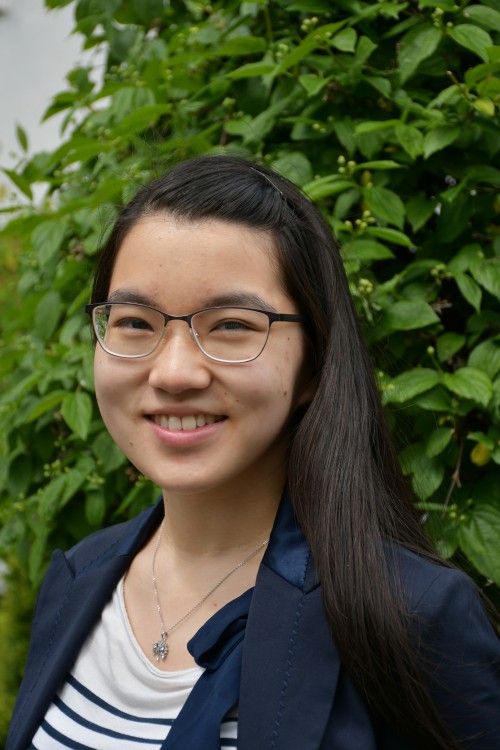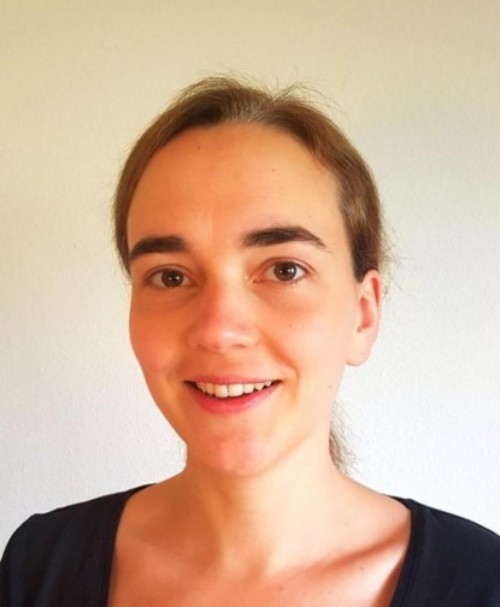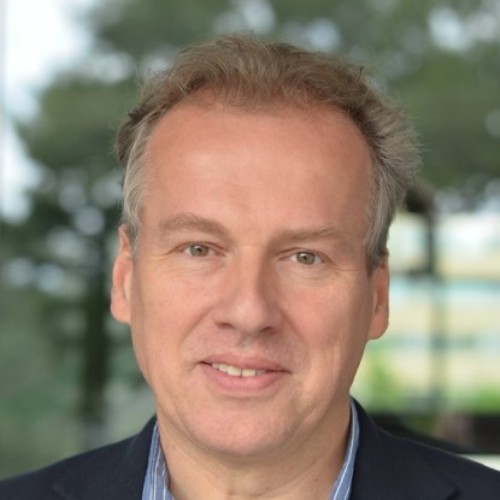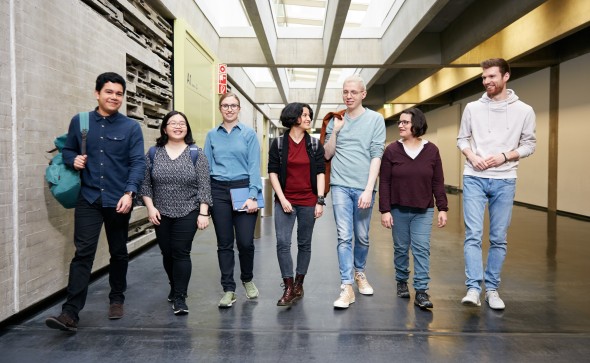Published: 14th June 2022
Haolin,
Mathematics M.Sc.
When teachers in school said that we would only touch on a topic in class and that you wouldn't learn about it in detail until you got to college, I wanted to know that more than anything.

Why I chose maths studies at TU Darmstadt
After school, I was initially unsure whether studying pure mathematics was right for me. My parents would have liked me to study something practical, preferably a STEM subject that included maths, but with a tangible job description that people could relate to – industrial engineering, for example. Maths were perhaps too abstract for them, and at that time I didn't know what was possible professionally with a maths degree. That's why I asked myself: If I won the lottery tomorrow, what would I study? If money didn't matter, what would I want to do? Then it dawned on me: Maths are simply what interests me the most. And then the decision was already sealed.
Maths have a lot of facets and are used in a wide array of different areas in science. For that alone, you should love math: Not only is it a science in its own, but it's also the language of science. Scientists all over the world express their findings and results in mathematical formulas. It doesn't matter whether it's physics, mechanical engineering, computer science, business administration or sociology. Maths play a role in one way or another in almost every course of study at TU Darmstadt. That alone is incredibly fascinating.
I am now studying mathematics in the master's program with a minor in economics at TU Darmstadt. We learn the basics in lectures, solve homework in small groups, and get tips and help from professors during office hours. In addition, we delve deeper into certain topics in seminars and give lectures to fellow students. So, it's not just the content that's varied, but also the daily routine. Each mathematical concept is a new challenge with its own rules. Within mathematics itself, there is theoretical mathematics and applied mathematics. I personally find algebra particularly interesting. I dealt with it more intensively in my bachelor's degree. In the master's degree, I decided to take stochastics as a further challenge, because this subject is not my strong suite.
I'm not worried about my future. Maths are everywhere, and many industries are looking for bright minds who have a good overview of connections and relations, can tackle problems in a structured way, and can work with others in a solution-oriented manner. Banks, management consultancies, insurance companies and IT are obvious options, but there are plenty of jobs that can be done with maths.
Study programs for people interested in maths: Here you will find something for yourself!
Maths are part of many study programmes. If you feel like getting to grips with maths, you can do so in many degree programs at TU Darmstadt. Here is a selection of study programs in which maths also play a role.
- Physics B.Sc./M.Sc./Teaching profession
- Chemistry B.Sc./M.Sc./Teaching profession
- Biology B.Sc./M.Sc./Teaching profession
- Materials Science B.Sc./M.Sc.
- Mechanical Engineering B.Sc./M.Sc.
- Aerospace Engineering M.Sc.
- Civil Engineering B.Sc./M.Sc.
- Architecture B.Sc./M.Sc.
- Environmental Engineering B.Sc./M.Sc.
- Applied Geosciences B.Sc./M.Sc.
- Electrical Engineering and Information Technology B.Sc./M.Sc.
- Information Systems Engineering B.Sc./M.Sc.
- Mechatronics B.Sc./M.Sc.
- Applied Mechanics B.Sc.
- Biomedical Engineering B.Sc./M.Sc.
- Cognitive Science B.Sc./M.Sc.
- Biomolecular Engineering – Molecular Biotechnology B.Sc./M.Sc.
- Computational Engineering B.Sc./M.Sc.
- Psychology B.Sc./M.Sc.
- Sociology B.Sc./M.Sc.
- Computer Science B.Sc./M.Sc./Teaching Certificate
- Business Information Systems B.Sc./M.Sc.
- Industrial Engineering with four different specialisations B.Sc./M.Sc.
Prof Dr Elena Mäder-Baumdicker
In school, you learn to calculate first and foremost. That's not real mathematics. There's really a big difference.

Maths have to be relearned at university: Have patience!
When studying maths at university at first you learn the basic. This is done in the first three to four semesters of the bachelor’s degree. Then the student can choose to go into applied maths or into other sub disciplines of the subject. To give you a small insight on how research works in this field two expert share their insights.
Prof. Dr. Elena Mäder-Baumdicker is a tenure-track professor and conducts research in the field of geometry and approximation. “This is a very interdisciplinary field within mathematics,” she says. “We want to understand the connections. We want to prove mathematically what geometric shapes look like and why they exist. For example, because they are particularly energy-efficient.” Natural shapes such as human blood platelets serve as an illustrative example. Why exactly this shape is created, what size they are, at what point a change in shape comes at the expense of energy, that's the mathematics. There is mathematics everywhere in nature, because shapes do not arise by chance, there is always a connection between costs and benefits, and these relations can be described with mathematics. The methods used by Prof. Dr. Elena Mäder-Baumdicker in her research are abstract. Studying general properties of an area that fulfil a certain differential equation for example. How to do this? With pen, paper, thought and conversations with colleagues.
Prof. Dr. Mäder-Baumdicker also had moments at school when she wished mathematics lessons had been more in-depth: “At school you mainly learn how to calculate. That is not real mathematics. The formulas are slapped on the table and you start calculating, which is different from real mathematics, which is about first choosing the right tools, working logically, finding and working out connections.
Like any subject, studying maths are demanding. But especially in maths, the dropout rate is relatively high. Prof. Dr. Elena Mäder-Baumdicker believes that most drop out too early and could have potentially been successful: ”When you start studying maths, you have to forget everything you learned at school. Even that 1 plus 1 is equal to 2. The knowledge has to be rebuilt step by step. Unfortunately, that's why mathematics has a high drop-out rate in the first semester.“ Mathematics takes time. Prof. Dr. Mäder-Baumdicker therefore advises giving maths a chance for at least a year and only then recapitulating: ”The realisation often comes afterwards. Sometimes it can take two years until you apply and understand something."
Prof Dr rer nat Karsten Albe
Mathematics are a central tool for researchers that we use. It is the most important computer-based tool for us. Mathematics enable us to write codes that are essential for the evaluation of our results.

Mathematics applied: Materials Research
As mentioned at the beginning, maths also play a major role in other departments.
Prof. Dr. rer. nat. Karsten Albe, Dean of the Department of Materials and Geosciences and professor specialising in materials modelling, has a very special relationship with mathematics himself; for him, mathematics are a tool. His research is primarily about finding out how materials behave under different conditions. To do this, the Department of Materials Science uses high-performance computers such as the Lichtenberg II. The cluster of the HKHLR (Hessian Competence Centre for High Performance Computing) computes simultaneously on problems with 10,000 cores and can precisely calculate the movement of individual atoms in solids under load. “This can no longer be calculated with pen and paper,” notes Prof. Dr. Albe. This produces huge amounts of data that need to be deciphered and understood.
“What the computer returns is a data file whose values are very close to a real solution. The following step is turning abstract information in this table into science,” says Prof. Dr. Albe. This is called post-processing of simulations and it is a visual preparation of the material science data with a colour scale that marks where cracks, deformations, wrinkles and the like have occurred. It makes it possible to observe the atoms in the immediate environment.
Prof. Dr. Albe uses a whole spectrum of mathematical tools. In addition, the borderline disciplines of computer science and data science, which are relevant to his research, also contain mathematical concepts and calculations. He sees this as a highly dynamic field with many developments: “Data science in particular has been a hot topic in recent years.”
Even professors started out small: “I come from physics, I had maths in my studies. But my first semester of maths, phew, I had no idea what the lecturer was talking about,” admits Prof. Dr. Albe. “Maths is like a recipe in this. You have to understand it and learn to use it, that's part of the path towards the result. If you master it, you have a big advantage.”
Maths are interdisciplinary and international
Precisely because mathematics are such a comprehensive and ubiquitous discipline, the study of mathematics is in itself international. The goal is to engage in interdisciplinary and international exchange. Formulas speak a global language and are therefore understood without words. However, these formulas have to be explained as well, which is why students at TU Darmstadt are taught to use English as the language to communicate what the formulas mean. That's why maths are becoming a bilingual degree programme, you can obtain a bilingual certificate at TU Darmstadt and more and more lectures are even offered exclusively in English.
But you don't need to be afraid of that! Maths English is actually easier than regular English is. Fortunately, the formulas don't change and are therefore always a great orientation.
That's why maths are also really interesting for international students. TU Darmstadt even offers the Master of Science in Mathematics completely in English. You can get an insight into the English-language Master's in Mathematics here. There is also a great buddy programme and other support services for international students.
And where do mathematicians work?
When choosing a course of study, it is important to enjoy it! All those who like to puzzle and solve problems, who ask themselves how solutions come about, what the path is like, will get their money's worth in the study of mathematics. Learning mathematics is like learning an instrument. It takes a lot of practice. Until you master this language well, until you have created a proof yourself, you need support and practice.
“When you're a student, you think you already have to think about your career when you choose your studies. You don't need to do that though. I didn't know that myself,” says Prof. Dr. Elena Mäder-Baumdicker. “There are many professions that people can take up after studying mathematics. For example, financial mathematics or actuarial mathematics, these disciplines are closer to everyday university life. Others may be further away, sometimes the profession ends up having nothing to do with mathematics. You can also get into management or even communicative activities are possible. With the background that students learn to think things through and make sensible suggestions, they can found a start-up with a great idea. Machine learning, data analyst, you get great job offers there too. What qualifies them then is that they've learned to understand context.”
If you want to learn more, we recommend “Today Maths, Tomorrow…?” This is a series of lectures by former mathematics students, mostly alumni of TU Darmstadt, who talk about where they work today and how their mathematics studies got them there. Super exciting, especially if you are still looking for prospects yourself or would like to make first contacts with companies.
On the job prospects page of the Department of Mathematics you will also find insights into which doors are open to you after graduation. Here, former students of TU Darmstadt tell you how their mathematics studies qualified them for their current job.
Perhaps you too will soon discover your love for mathematics? If you have any questions about studying at TU Darmstadt, please contact the Central Student Counselling and Orientation Office (ZSB), the International Admissions Office and the Mathematics Office.
If things get stuck: TU Darmstadt offers help with mathematics
Admittedly, studying is no walk in the park. Sometimes you can use a little support. Students with university admissions from different federal states and from abroad should all be able to study together at the same level. That's why there is a wide range of support, especially in maths, to help you before and during your studies so that you don't lose your way.
Before the studies
- Maths pre-course: an absolute recommendation for all STEM degree programmes, so that you don't feel overwhelmed right at the beginning of your studies. The online pre-course in mathematics, which you can take before your first semester, offers you the opportunity to find your way into everyday study life, fill in gaps and refresh your knowledge. Here you can also make your first contacts at your new university in digital events.
- GeWoWe: What does it cost to study? The Money and Housing Weekend organised by the Mathematics Student Council offers all first-year students support with financial planning and finding a place to live. Here you can also meet future fellow students before the semester starts and get to know the university and the city from a distance.
- OWO: The orientation week is the highlight for all first-semester students. It takes place the week before lectures begin in the winter semester. Here you get to know your new fellow students and get all the important information about studying and the university.
During studies
- In addition, there is also a mentoring programme (opens in new tab) in the bachelor’s and teacher training programme in mathematics. Here, first-year students receive support in small groups from more experienced students. In this way, you get to know new people right at the beginning, get motivated, receive orientation and support with questions and hurdles.
Offers for international students
- The buddy programme is primarily aimed at international students starting the English master's programme and Erasmus incoming students. Experienced students support their mentees with questions about the TU, studying and the city.
- PreCIS stands for “Preparatory Course and Support Programme for International Students”. Here, international students are prepared for German-language courses and are taught relevant vocabulary for their degree programme – including, of course, specialist mathematics language!
Interdisciplinary research using iron as an energy source as an example
The project Clean Circles teams up scientists from multiple disciplines to explore how iron and its oxides can be used in a cycle as carbon-free chemical energy carrier to store wind and solar power. Watch the video to see what role Math plays in this.
More info here
Recommended external content
We have selected external content from YouTube for you and would like to show it to you right here. To do this, you must reveal it with one click. You can hide the external content at any time with another click.
I agree to external content from YouTube being shown to me. This may result in personal data being transmitted to third-party platforms. You can find more information in our Privacy Policy.

Haolin
Hello! My name is Haolin and I am studying mathematics with a minor in economics at TU Darmstadt. What I didn't know before I started studying is that mathematics consist largely of creative teamwork. It's much easier to come up with the right ideas to solve difficult mathematical problems with fellow students. At TU Darmstadt, I feel incredibly well taken care of whether it's mathematical or organisational problems, you're always supported.



